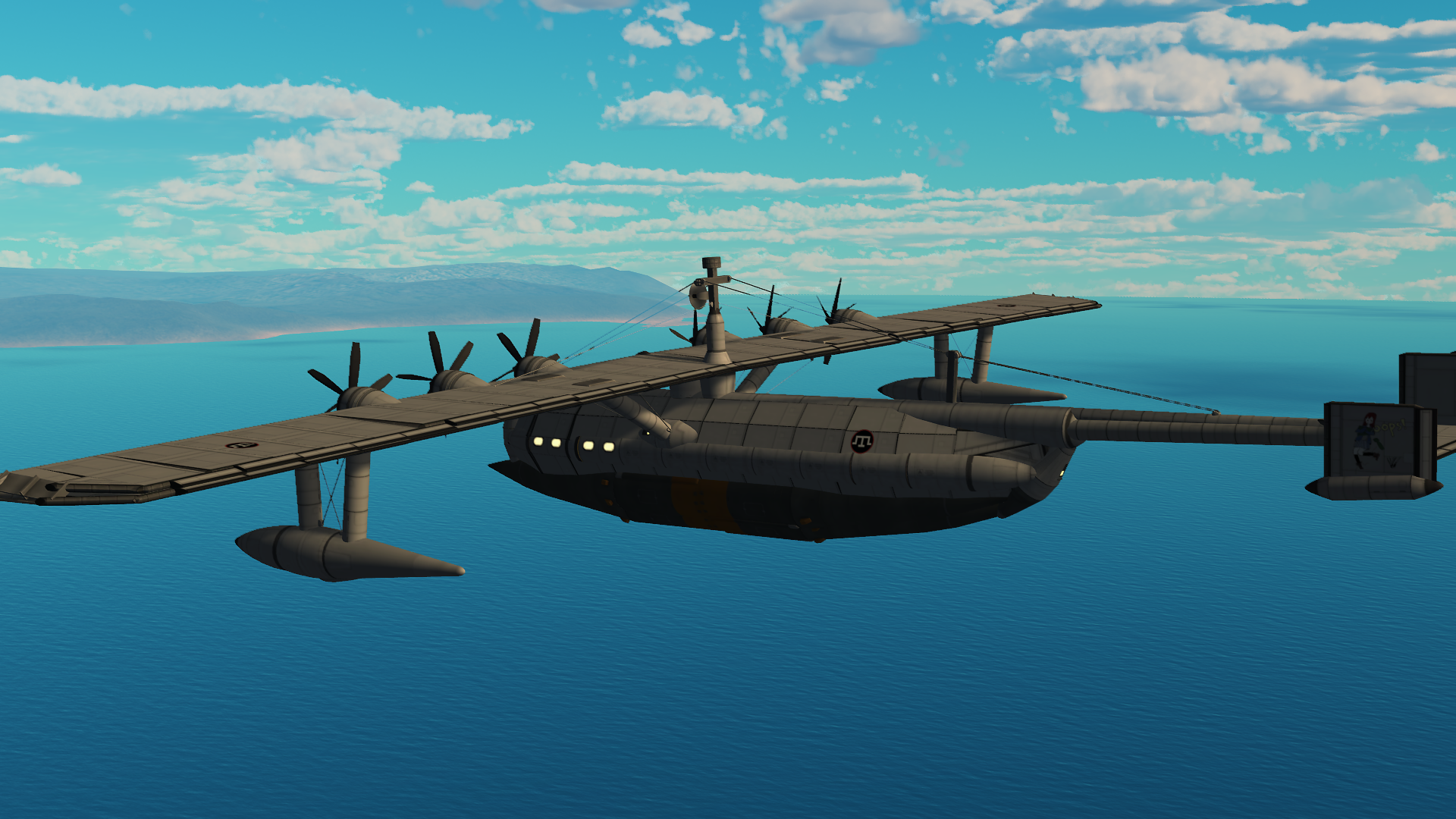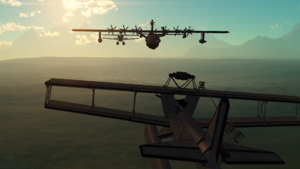Abzalev Arrow
|
Abzalev Arrow
Abzalev A-6 Arrow
|
|||||
|---|---|---|---|---|---|
| Flying-Boat | |||||
 |
|||||
| Abzalev Arrow "Oopsies!" Flying over the Straits of Aontas | |||||
| Role | Fuel transport, VIP transport, Search&Rescue, | ||||
| National Origin | Sahr | ||||
| Production History | |||||
| Produced | |||||
| 2161 - 2210(Planned) | |||||
| Designer | Abzalev Design Bereau | ||||
| Unit Cost | 177,513(√) | ||||
| Number Built | 60~ | ||||
| Service History | |||||
| In Service | |||||
| 2161 - Ongoing | |||||
| Used By | Sahren Republican Guard Sahren coast service Sahren Republican Navy | ||||
| Aircraft Characteristics | |||||
| Dry Mass | 71.9 Tonnes (unloaded) 106 Tonnes (max load) | ||||
| Length | 36.6m m | ||||
| Width | 52m m | ||||
| Height | 11m m | ||||
| Propulsion | 6 x Alkan Tractor Company Type-2161 LFO-electric turbines | ||||
| Maximum Velocity | 133.8m/s | ||||
| Operational Range | 1,600 (full load) km | ||||
| Crew | Pilot, Copilot, Engineer 8 passenger capacity |
||||
| Variants | Abzalev Ostaleech |
||||
The Abzalev Arrow is a six engine flying boat manufactured and supported by Sahren aircraft manufacturer Abzalev Design Bereau.
The Abzalev Arrow was specially requested by the Sahren Republican navy as a liquidfuel transport in order to service new naval vessels that were planned to enter service in the 2160s-70s.
The maiden flight of the Abzalev Arrow took place on 7rd of Lutzayu, 2156 but would not enter into production until a year later due to engine supply chain issues. By 2161 the aircraft swapped to a more powerful and efficient Type2161 LFO-electric turbine. This new model would become transport for senior military officers, the president, and the king. The Ostaleech varient was produced as an experiment with parasite aircraft which proved promising yet unsuccessful.
Development
Abzalev Arrow
By 2157 new rounds of naval production were planned which would later be delayed due to economic stagnation. The Sahren Republican Navy requested a fuel transport for the new fleet along with other aircraft for auxiliary uses. Abzalev, Alkan, and Tsaregorodtsev aviation began to work on the projects simultaneously. Alkan abandoned the project shortly after as it entered decline and would later dissolve in the hysteria of the 2160s. Tsaregorodtsev aviation had only just been recreated as a measure to artificially introduce competition, which plagued their jet powered design with such numerous flaws Tsar dropped out of the competition.
The Abzalev Arrow was chosen to use LFO-electric hybrid propellors rather than jet alternatives, which gave the aircraft superior low speed performance. The entire airframe was designed around low speed takeoff so payload capacity could be maximized at all other expenses. This caused an oversight with fuel lines in the rear of the fuelselage, which caused violent detonation if landings were too harsh.
Ostaleech
The Abzalev Ostaleech was a varient specially built to carry Abzalev A-2 Leech aux biplanes as a parasite fighter experiment. The experience proved just how innefective the concept was, however the two converted varients remained for further testing and the prestige it brought the company.
Design
The Abzalev Arrow is a Six engine LFO-electric powered multipurpose flying boat. No previous domestic designs existed of this scale to develope from, so the hull was essentially a Khosa class battleship scaled far lower. The airframe has two cockpits, one mounted on top of the nose for in flight use and one on the front of the nose for purposes of sailing and water landings. The wings are behind the cockpit and raised, being thick enough to allow an engineer to crawl through and perform maintenance on the LFO turbines in the middle of flight. On top of the wings is a shiplike mast containing communications equipment, which would also allow a flag to be brandished if the aircraft was to sail for long periods of time. Wind tunnel testing revealed the yaw fin too small, resulting in the triple stabilizer setup on the final design.
The Abzalev Arrow had some of the most excellent performance at low speeds that the nation had ever seen, requiring less takeoff speed on water than on land. The wings and fuelselage were more than strong enough to pull out of the most disasterous dives without suffering significant damage. Pilots lack control of throttle entirely, instead controlling throttle by adjusting propellor pitch.
The interior of the Abzalev Arrow more closely resembles a ship than a flying boat. It has multiple decks and cabins and even inflateable lifeboats that can be shoved out of the hatches for easy escape in a disaster. Hatches are located above the waterlight on the port and starboard sides, and an additional one in the rear inches away from the waterline.
The Abzalev Arrow has been praised for it's ability to land nearly everywhere on kerbin that has a harbour, as airfields of such length rarely existed in sahrland or were in a state of ruin and disrepair following the numerous conflicts. Despite this the Arrow still fell into favour by the Sahren Republican Guard for transport of VIPs.
Variants
Abzalev Ostaleech
The Abzalev Ostaleech (often shortend to just Ostaleech) was designed to carry Abzalev A-2 leech biplanes underslung by the wings. The biplanes were capable of refueling after docking, however the purpose was to experiment with aerial refueling, parasite fighters, and airborne carriers as a whole. The varient proved parasite fighter concepts largely innefective.
Detonation controversy
After the first Abzalev arrow detonated in a weather related accident in early 2163, it was investigated thoroughly and the issue with fuel lines in the rear fuelselage were found. To avoid this pilots were instructed to always land with thrust reverser at the maximum, always land level or angled upward, and to always land at 50 metres per second or lower.
Detonation incidents have plagued the career of the Abzalev arrow, claiming the lives of 9 crewmembers and 3 aircraft so far. Advances in flight training and caution have led to fewer incidents as time progresses


